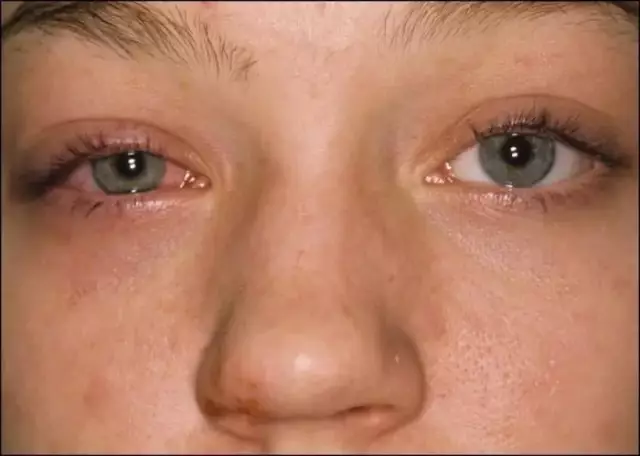- Author Rachel Wainwright wainwright@abchealthonline.com.
- Public 2023-12-15 07:39.
- Last modified 2025-11-02 20:14.
Herpetic stomatitis
Herpetic stomatitis is a viral disease caused by the herpes simplex virus, which is widespread in nature.

Once in the body, the herpes simplex virus often does not give out its presence in any way, however, the pathogen can manifest itself against the background of weakened immunity, endocrine system disorders, emotional stress, overheating, hypothermia, injuries of the oral mucosa, and many other factors.
Primary infection occurs by airborne droplets or by household means, as a result of which a person (most often in children from 1 to 3 years old) begins to develop acute herpetic stomatitis, which, in the absence of systemic treatment, can easily turn into a chronic form.
Unlike children, the occurrence of herpetic stomatitis in adults occurs much less frequently, but its course is characterized by a particular severity, aggravated by the presence of carious teeth in the mouth, smoking, trauma to the oral mucosa with too spicy or hot food, enlargement of gum pockets, etc.
Acute herpetic stomatitis: symptoms, forms
The disease begins with a deterioration in the general condition of the body, accompanied by weakness, fever, drowsiness, and decreased appetite. Herpetic stomatitis in infants is manifested by "causeless" whims, crying, increased salivation with an unnatural smell, refusal to eat. Older children complain of nausea, headache, and a burning sensation in the mouth.
Since at this stage of herpetic stomatitis there are no pronounced manifestations on the oral mucosa, during this period of the illness, otolaryngologists may make an erroneous diagnosis - angina or ARVI.
Further, in the mouth on the gums, lips, back surface of the cheeks, foci of infection begin to appear in the form of redness, swelling, swelling, in the place of which a person feels itching, burning and pain. After 1-2 days, characteristic bubbles form in these places: one, two or several (no more than six) elements. After 3-4 days, the bubbles ripen, burst and form into small drying out and gradually epithelializing ulcers. This is a mild form of herpetic stomatitis, which heals quickly and does not pose a particular danger to the patient's health.
The moderate form of acute herpetic stomatitis is characterized by severe symptoms of intoxication, while the submandibular lymph nodes enlarge and become painful. At the peak of hyperemia and high body temperature (up to 38-39 degrees), on the skin of the oral region or in the oral cavity, the appearance of abundant vesicular rashes (from 10-25) is observed, and under unfavorable treatment conditions, they merge and subsequently ulcerate.
The severe form of the disease is quite rare and, most often, in older people. In the prodromal (beginning, flowing before the appearance of clinical signs) period of herpetic stomatitis in adults, all signs of an acute infectious disease are observed: headache, apathy, weakness, arthralgia, musculocutaneous hyperesthesia. The conjunctiva of the eyes may be slightly edematous and hyperemic. After 1-2 days, typical herpetic vesicles appear in the mouth, eyelids, on the skin near the oral cavity, on the earlobes, fingers, conjunctiva. At the height of the disease, their number can reach 100 pieces. Elements merge, forming extensive areas of mucosal necrosis. During this period, there is a putrid odor from the mouth, profuse salivation, often mixed with blood. If this condition occurs in children,herpetic stomatitis in severe form is subject to treatment in a hospital setting in the isolation ward of an infectious diseases hospital.
Herpetic stomatitis: diagnosis and research

The diagnosis of acute herpetic stomatitis is confirmed by cytomorphological examination of smears from the oral mucosa. Also, with the help of washings from the mucous membrane, the presence of virus-specific nucleotide followers of the herpes simplex virus is determined.
Children suffering from herpetic stomatitis are assigned additional studies, since the herpes virus tends to manifest itself against the background of a weakening of the general and local immunity of the body. For this, the level of immunoglobulins, the content of lysozyme in saliva, as well as the state of local immunity of the oral mucosa are studied.
Treatment of herpetic stomatitis
Treatment of herpetic stomatitis, regardless of the patient's age, is carried out by eliminating the pain symptoms of stomatitis in combination with antiviral therapy.
There are general and local types of medical intervention for herpetic stomatitis. The general includes:
- Antiviral drugs prescribed in the first 5-7 days of the disease (virolex, acyclovir, famciclovir, bonafton) as directed by a doctor;
- Antipyretic and analgesic agents;
- Antihistamines (tavegil, claritin, suprastin, fenkarol);
- Vitamin therapy (ascorbic acid);
- Preparations for the correction of the immune system (sodium nucleinate, imudon).
As a local treatment for herpetic stomatitis, the following are prescribed:
- Pain relievers (lotions and applications of solutions of pyromecaine, trimecaine, lidocaine);
- Antiseptics for treating the oral cavity as weak solutions of furacilin, potassium permanganate;
- Enzyme preparations for cleansing erosions from necrotic tissues;
- Antiviral agents in the form of ointments and applications;
- Epithelizing agents (sea buckthorn oil, rosehip oil, vitamin A oil solution, solcoseryl);
- Anti-inflammatory and antibacterial agents;
- Aniline dyes (brilliant green solution) for treating lesions on the skin.
Drinking plenty of fluids, taking a multivitamin complex, rubbing food that does not irritate the mucous membranes, as well as giving up bad habits will help speed up the recovery from herpetic stomatitis.
YouTube video related to the article:
The information is generalized and provided for informational purposes only. At the first sign of illness, see your doctor. Self-medication is hazardous to health!






